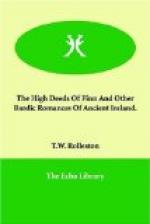The Fianna were under the rule of one great captain or chief, and at the time I tell of his name was Cumhal, son of Trenmor. Now a tribe or family of the Fianna named the Clan Morna, or Sons of Morna, rose in rebellion against Cumhal, for they were jealous and greedy of his power and glory, and sought to have the captaincy for themselves. They defeated and slew him at the battle of Cnucha, which is now called Castleknock, near the City of the Hurdle Ford, which is the name that Dublin still bears in the Irish tongue. Goll, son of Morna, slew Cumhal, and they spoiled him of the Treasure Bag of the Fianna, which was a bag made of a crane’s skin and having in it jewels of great price, and magic weapons, and strange things that had come down from far-off days when the Fairy Folk and mortal men battled for the lordship of Ireland. The Bag with its treasures was given to Lia, the chief of Luachar in Connacht, who had the keeping of it before, for he was the treasurer of Cumhal, and he was the first man who had wounded Cumhal in the battle when he fell.
Cumhal’s wife was named Murna, and she bore him two sons. The elder was named Tulcha, and he fled from the country for fear of Goll and took service with the King of Scotland. The younger was born after Cumhal’s death, and his name was called Demna. And because his mother feared that the sons of Morna would find him out and kill him, she gave him to a Druidess and another wise woman of Cumhal’s household, and bade them take him away and rear him as best they could. So they took him into the wild woods on the Slieve Bloom Mountains, and there they trained him to hunt and fish and to throw the spear, and he grew strong, and as beautiful as a child of the Fairy Folk. If he were in the same field with a hare he could run so that the hare could never leave the field, for Demna was always before it. He could run down and slay a stag with no dogs to help him, and he could kill a wild duck on the wing with a stone from his sling. And the Druidess taught him the learning of the time, and also the story of his race and nation, and told him of his right to be captain of the Fianna of Erinn when his day of destiny should come.




